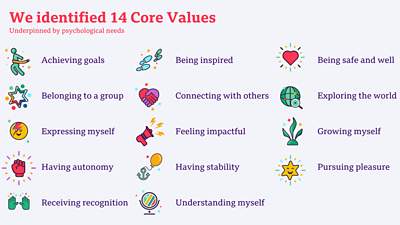We aim to develop a framework to understand how core human values, underpinned by psychological drivers and innate needs, are prioritised by people across different stages of their lives. In doing so, we hope to help the ΒιΆΉΤΌΕΔ create experiences that are relevant to audiences across these changing situations and contexts.
Project from 2019 - present
Why it matters
The digital landscape of daily life provides an abundance of choice, enabling people to use a multitude of platforms to consume media whenever and wherever they want. Changing lifestyles and expectations have . On-demand, mobile and personalised is a long way from the world of with a common schedule to a common venue (i.e. the living rooms of 20 million households).
An internet connection and an ever-increasing range of . The ΒιΆΉΤΌΕΔ's traditional measures of β' and β' may no longer be reliable as proxy metrics for the delivery of public purposes as they once were.
The metrics for the ΒιΆΉΤΌΕΔ's success will always remain focused on the impact we can have on the lives of our audiences. What is changing is that we can no longer rely on mass viewing figures as measures of impact as they become less valid representations of attention across an increased diversity of audiences and lifestyles.
Beneath the ΒιΆΉΤΌΕΔ's broad aims of β' sit specific goals about contributing to the lives of people and communities. Specifically:
"to help people understand and engage with the world around them..."
"to support learning for people of all ages..."
-
Broader competition for time and attention and the use of the internet as a broadcast platform change the metrics for successful delivery of the public purposes in at least two ways:
- There is a greater imperative to focus on impact directly rather than the proxy of time spent with ΒιΆΉΤΌΕΔ content,
- The interactive nature of the internet enables a more focused, personalised and responsive engagement with individuals rather than a one size fits all broadcast to millions. Engagement with members of the audience becomes more like a dialogue than a broadcast to the nation.
Download our Digital Wellbeing toolkit:
How it works
Our Digital Wellbeing work aims to cast the ΒιΆΉΤΌΕΔ's existing public purposes in a form that can be understood within the context of people's everyday lives and personal journeys. We aim to develop tools that use the vocabulary of individual needs and values to help inform the design of future services. In doing so, we aim to inform the creation of metrics that are valid, reliable and feasible for measurement of the ΒιΆΉΤΌΕΔ's progress in an internet age.
As a starting point, we will focus on 16-34 year-olds. This group is currently as young people's lives are most affected by digital technologies and services.
To understand how to enhance the quality of people's lives, we need to first understand people on a core psychological level:
- What is fundamentally important to people in life?
- What do people value?
- How do values drive their behaviour?
We believe that supporting people to fulfil their values using ΒιΆΉΤΌΕΔ content and services, as well as in other ways, will allow the ΒιΆΉΤΌΕΔ to play a beneficial role in people's lives, rather than simply counting how many people used a service and for how long. In doing so, we can preserve people's values by putting their best interests at the heart of decisions the ΒιΆΉΤΌΕΔ makes.
What do people value?

Values are judgments about what people deem to be necessary, but also represent that drive and shape everyday behaviour. While it can be difficult for people to describe their needs without a level of self-awareness, values are easy to explain and so act as a gateway to understanding people on a deeper level.
We have researched core human values by conducting user studies, empirical research, and cross-referencing this with psychological theory and evidence. In doing so, we have identified a set of 14 human values (shown above); scientifically-evidenced psychological drivers that characterise what is fundamentally important to people in life.
Values across life stages
People prioritise different values at different points in life, which refers to value priorities. Changes to value priorities vary in response to different stages of life (e.g. school to university), new environments (e.g. relocating), and specific events (e.g. facing a significant life event).
We are researching how value priorities correspond to stages of life between 16 and 34 to fully understand this audience group. This will help to deliver a personalised ΒιΆΉΤΌΕΔ that plays into people's values and not just into their media consumption.
Measuring value
To demonstrate the success of delivering a personalised ΒιΆΉΤΌΕΔ that addresses people's values, we need new ways to measure how well we are achieving it. In a digital world, attention and measuring the time people spend consuming content is an unreliable measure and not a valid way to demonstrate the success of delivering public purposes. We are providing the means to measure new forms of value.
Designing value
We are currently developing Human values tools to help us generate new ideas and innovate. These tools put values at the centre of the design process to ensure that new ideas, services and products have a human focus.


